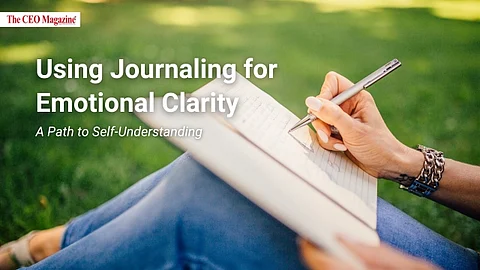
- News
- Women
- Magazine
- IndustryIndustry
- InsightsInsights
- Success Stories
- PublishPublish
- ContactContact
- Media KitMedia Kit

Using Journaling for Emotional Clarity: A Path to Self-Understanding
Journaling is a powerful tool for achieving emotional clarity and self-understanding. By regularly writing down thoughts and feelings, individuals can gain deeper insights into their emotions, manage stress, and foster personal growth. This article explores how journaling can enhance emotional clarity and provides practical tips for making the most of this practice.
Journaling allows you to explore and articulate your emotions more clearly. By writing about your experiences and feelings, you can identify patterns and triggers that influence your emotional state. This process helps in gaining a better understanding of what drives your reactions and responses.
Regular journaling provides a safe space to express and process stress and anxiety. By externalizing your worries and concerns on paper, you can reduce their intensity and gain perspective on how to manage them. This practice can be particularly beneficial during challenging times or when dealing with overwhelming emotions.
Through journaling, you can track your emotional progress and personal development. Reflecting on past entries allows you to recognize changes in your thoughts and behaviors, helping you identify areas for growth and improvement. This ongoing self-reflection supports continuous personal development.
Select a journaling medium that feels comfortable for you. Whether you prefer a traditional notebook, a digital app, or even voice recordings, the key is to choose a method that encourages regular and honest expression.
Set aside dedicated time for journaling each day or week. Consistency is crucial for reaping the benefits of this practice. Establishing a routine helps in making journaling a habit and ensures that you regularly engage with your emotions.
If you're unsure where to begin, use journaling prompts to guide your writing. Prompts can help you explore different aspects of your emotions and experiences. Examples include, “What are three things I’m grateful for today?” or “How did I feel after a recent challenging situation?”
Write freely and honestly without worrying about grammar or structure. The purpose of journaling is to express your genuine thoughts and feelings. Allow yourself to be unfiltered and candid, as this authenticity enhances emotional clarity.
Periodically review your journal entries to reflect on your emotional journey. Look for recurring themes or patterns and consider how your emotions have evolved over time. This reflection can provide valuable insights and help you track your progress.
Combine journaling with other self-care practices, such as meditation or mindfulness. Integrating journaling with these practices can enhance your overall emotional well-being and provide a more comprehensive approach to self-discovery.
Establish specific goals for what you want to achieve through journaling. Whether it’s improving emotional resilience, gaining clarity on personal goals, or simply finding a way to cope with stress, having clear objectives can guide your journaling practice.
If you find that journaling brings up challenging emotions or if you're struggling with emotional issues, consider seeking support from a mental health professional. They can provide additional tools and strategies to complement your journaling practice.
Journaling is a valuable tool for gaining emotional clarity and fostering personal growth. By understanding your emotions, managing stress, and reflecting on your experiences, you can achieve greater self-awareness and emotional well-being. Incorporate journaling into your daily routine and explore its benefits to enhance your emotional clarity and overall quality of life.
Follow us on Google News
